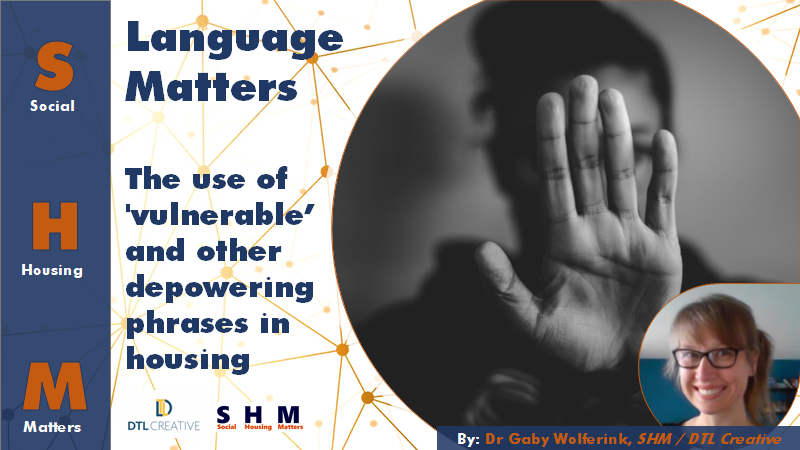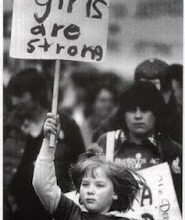
Just like social housing matters, language matters. What we say, why we say it, to whom and in what way can make all the difference not only in building great relationships and trust (or the opposite, of broken relationships and mistrust), but it can also create and uphold power imbalances and contribute to ever-entrenching stigma.
If you didn’t know already, language holds power, and those with the power to wield the language, sending it from one direction to another, should be more aware of this in their everyday practices and dealings with other people. In this article specifically I’ll focus on the words ‘vulnerable’ and the phrases ‘giving a voice’ and ’empowering’, phrases that are overused in the housing sector.
Vulnerability as an umbrella term
One of the things the housing sector (and it is not alone in this) likes to do is group people. There’s no inherent malice in that; there is this idea that if we can group people, there is more order, and where there is more order, work can be done more efficiently, and in this case, people can be ‘protected’ better from ‘harm’.
However, ‘vulnerable’ is a very vague word. It doesn’t say anything specific about anyone. In fact, the only thing that it is specific about is that it implies a flaw in that person’s or group’s ‘being’, it implies that there is something wrong with them, that ‘vulnerable’ is intrinsic. “It is decidedly extrinsic.”, and if anything, they are made vulnerable to “patterns of institutionalized bias” (Holloway, 2011).
As Amy S. Katz, talking about the use of the word ‘vulnerable’ in health care, puts it:
No group of people is inherently vulnerable. If a group of people is experiencing vulnerability in a particular situation, setting, system or society, that vulnerability is being produced by other people. It is entirely possible to trace how that vulnerability is produced, and who is responsible. When we leave it at “vulnerable groups” – the implication is that the vulnerability is built in, it’s a deficit, it’s a condition internal to the group. So, our role as health care providers or researchers is then to save people from their own vulnerability. (Katz, in Stranges, 2019)
While Katz is talking about health care providers and researchers in that field, I could easily switch around ‘health care providers’ with ‘social landlords’ and those who cater to them.
The housing sector, and again, it is not alone in this, never talks about the groups that (according to its own policies, procedures and data) are not vulnerable and can access services, nor why it is that they can. What is it that defines this group that makes them not vulnerable? This too raises questions.
First, of course, is this a correct assumption, are the people they expect to be able to access their services able to and treated fairly? Does the sector decide and have the power over who is vulnerable (and deemed worthy of rescuing) and who isn’t? A second question that comes to mind is why they don’t talk about and of the WHY these people are able to access services as opposed to others.
Is it because they are part of the group that, whether consciously or unconsciously contributes to maintaining any divisions that might or might not exist?
Pointing to people and groups of people as vulnerable differentiates them and puts them at a straight disadvantaged as it invokes and legitimises the saviour narrative.
Any research and data in systems that housing providers use are based on survey data, administrative data, systematic reviews of evaluations and contact moments that are documented about, not by the people or groups of people identified as vulnerable.
Even if people are at risk of being harmed by others, what has become known as being classed as ‘vulnerable’, people might not consider themselves as such, or deny this exactly because accepting being classed as ‘vulnerable’ comes with the implication of it being a flaw, there something being wrong with THEM, rather than something being wrong with ‘the system’. Often, because the onus is placed on ‘the vulnerable person’, instead of seeing the system (and this isn’t just society or at governmental level, but also within a housing provider’s policies and procedures) as flawed, the system can be used as the complete opposite and instead being articulated as the ‘saviour’.
As shared in the toolkit of ‘See the Person’, a tenant campaign put it, using words like ‘vulnerable’ feed “the idea that social housing providers and their staff in some way rescue tenants and promotes this approach in their communications including using terms like ‘turning people’s lives around’.” (See the Person, 2020).
Who holds the power?
Language like this and the ‘saviour complex’ in which it is used, also invites and strengthens further types of language and use of phrases that add even more to the already damaging stigma that surrounds social housing tenants. Specifically, the language framework that enables speaking about people and groups of people as simply ‘vulnerable’ adds to the stigma of social housing tenants not being independent, a burden on the State, needing to be cared for, guided and told what to do (and not to do).
There are two phrases in particular that I want to put some specific focus on: ‘Empowering’ and ‘Giving a Voice’, phrases that are used by landlords, suppliers, governing bodies and professional sector bodies alike.
Let’s start with empowering. In its crudest sense, it means ‘to give (someone) the authority or power to do something’, and while it is often used, like the use of vulnerable, without any intended malice, this, I believe, comes from its focus on the final bit of that meaning, ‘power to do something’, which is good. However, if we also take into account the first bit, it implies that this power is something that can and should be given out, granted, and that can be taken away. In this case, it is the landlord that gives ‘vulnerable people’ authorisation or power to be able to do something.
This could, and I feel should, be seen as problematic, as it implies that people are powerless until they have been granted, given the power to act instead of in some ways (again, that doesn’t need to be a conscious thing…) being kept away from using the power they have already.
That brings me to the second phrase, ‘Giving a Voice’. Like with the use of empowerment and giving people power (or allowing them to utilise the power they have already), the idea of people, and in this case, tenants being voiceless until the landlord gives them a voice is one that we need to steer away from as soon as possible.
I shouldn’t have to make the same argument as above, but just to ensure it lands: tenants don’t need you or anyone else to ‘give them a voice’; they already have one, just like you. Like with ‘vulnerable’ and ‘empowerment’, the flaw is placed with and deemed inherent to the, in this case, tenant; they do not have a voice, or so you say. Just look at that again, ‘or so you say’.
Housing management systems, voicemails and emails are filled with voices of tenants. Requesting services, requesting changes to services, complaining about service and communication failures, there’s even some compliments in there from time to time I’ve heard. The only thing that needs to be improved on is the listening part, to get these voices that are already everywhere heard and listened to.
Examples from registered providers in UK Housing?
I’m not in the business of naming and shaming and do not want to single out any housing providers, institutions or suppliers. This is not because I think I’d be saying anything unkind or something that is untrue, as all the available examples come from publicly accessible documents and websites. But it is of no use to single businesses and organisations out because it happens all across the UK and beyond.
The only thing you need to do to get an idea of the extent of this use of language is to enter ‘vulnerable’, ‘empowering’ and/or ‘giving a voice’ into google alongside ‘housing’ or ‘social housing’, and you’ll be hit with a significant sample size. There’s also a good chance that you recognise the phrases from your own organisation, your own slide decks, strategies and product descriptions.
So, I’m not dwelling on this section for too long. Let’s get to the things where we, you, can make a difference.
Finally, that top 3 you were promised!
The use of words and phrases like ‘vulnerable’, ‘empowerment’, and ‘giving a voice’ has been engrained in the language of society for many, many years, not just, but also in housing.
Changing the narrative and recognising that language has a significant kind of power that can be used for both good and bad is everyone’s responsibility.
So, to end this already too lengthy article, I could talk about this for DAYS, WEEKS, MONTHS, really, I will provide you with more than a list of things you shouldn’t do. So, please find below 3 changes that I suggest can be made in the language used in your systems and marketing collateral that can start making a big difference.
1. Ditch the world ‘Vulnerable’ altogether in all your systems, tools and strategies.
Perhaps the word that comes closest to a suitable replacement is ‘marginalised’, as it at least implies that people are placed in a position of disadvantage by force of something outside of themselves instead of putting or framing the flaws and blame on them.
As I have explained above, people don’t like to be talked about or grouped together based on anything that places them in a subservient, faulty or damaged position from the get-go, especially if this is done without their consent and without their knowledge, based on raw data and/or demographics. How you talk about tenants internally guides how your staff will see them, talk about them and talk to them.
2. Instead of using ‘Empowering’ in your marketing materials, corporate plans and mission statements…
…focus on offering flexible methods and channels of communication, repairs reporting, and if anything the guarantee that people do not need to be talking to landlords on a semi-daily basis to get a single query answered or resolved. If anything, the one that needs empowering is the sector itself to recognise the tools they have at hand to be able to get at least the basics right in providing good quality home: listening and communicating, which brings me to point 3:
3. Instead of using ‘Giving a Voice’ in your scrutiny activities and tenant panels…
…focus on what you as a landlord can do to listen better, put the onus on yourself to improve services based on what you are being told, either in conversation, email, or even from systems data (someone calling 4 times about the same issue needn’t tell you explicitly you need to do better…!). Indeed, tenants, applicants and everyone who deals with landlords share feedback, opinions, ideas and sentiments all the time, every day, in every interaction. The only thing you need to do is be willing to listen and learn.
References
Holloway, Karla F.C., “Vulnerable” Populations: Medicine, Race, and Presumptions of Identity, AMA Journal of Ethics. 2011. Link: https://journalofethics.ama-assn.org/article/vulnerable-populations-medicine-race-and-presumptions-identity/2011-07
See the Person. It’s Not Okay – A guide to tackling stigma in social housing. https://seetheperson.org/wp-content/uploads/2020/09/Guide-to-tackling-stigma.pdf
Stranges, J. Words matter: the use of vulnerable in health care and public health. St Michael’s Hospital Newsroom. Toronto, 2019. Link: https://www.stmichaelshospital.com/media/detail.php?source=hospital_news/2019/0830
Walker, Alexis K., and Fox, Elizabeth L., Why Marginalization, Not Vulnerability, Can Best Identify People in Need of Special Medical and Nutrition Care. AMA Journal of Ethics, 2018. Link: https://journalofethics.ama-assn.org/article/why-marginalization-not-vulnerability-can-best-identify-people-need-special-medical-and-nutrition/2018-10



